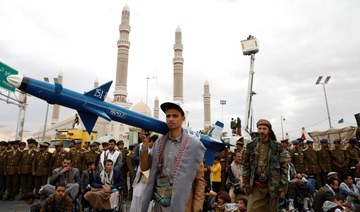BEIRUT: A significant portion of Lebanese people have aired their concern over Hezbollah supporters’ stance on ongoing violent clashes in the border region.
The criticism by Maronite Patriarch Bechara Boutros Al-Rahi — who advocates for “Lebanon’s neutrality” regarding operations carried out by Hezbollah toward the Israeli army — triggered angry reactions on Monday.
Hezbollah supporters attacked Al-Rahi on social media as hostilities escalated on the southern front.
The organization introduced a new weapon amid Israeli threats of a wide-scale military operation inside Lebanese territory and talk of training and maneuvers for Golani Brigade soldiers coming from Gaza to the northern border.
In his Sunday sermon, Al-Rahi expressed the views of those opposed to such involvement, criticizing the “excess of power under the headless state.”
He said: “The residents of the border villages in the south have expressed their pain to us about the state abandoning them while they endure the brunt of the imposed and rejected war.
“They consider that Lebanon and the Lebanese have nothing to do with it (the war).”
Al-Rahi conveyed their rejection of being used as “hostages, human shields, and scapegoats for failed Lebanese policies and the culture of death that has brought nothing to our country except imaginary victories and shameful defeats.”
Pro-Hezbollah activists responded, with one saying: “He who gave the sermon needs to be preached to.”
Another said: “Hezbollah’s culture is the culture of triumph over death.”
Al-Rahi’s defenders continued to criticize Hezbollah supporters. One activist requested a stop to “accusations of treason against anyone who rejects Hezbollah’s performance and criticizes its loyalty to Iran.”
Lebanese Forces MP Ghayath Yazbek said: “To those who attack the Maronite Patriarchate, you live in a state whose borders were demarcated with a thread drawn from the robe of a patriarch, and you swing safely on a branch of its blessed cedar. Suppress evil tongues before you bring down Lebanon and regret it.”
Independent MP Neemat Frem said: “The brutal campaign against Patriarch Al-Rahi on social media is shameful and strongly condemned.
“This is not how we communicate with a national authority that carries the people’s pain, stands by legitimate institutions, opposes war, and speaks out on the culture of life. What is happening is very shameful.”
On Sunday evening, Hezbollah revealed its use — for the first time — of Almas anti-tank guided missiles in its attacks against Israeli sites.
A southern security source said: “There has been a gradual increase in Hezbollah’s weapons in recent weeks, from the use of the Burkan missile to the Falaq 1 missile to the Almas missile. Its goal is most likely to maintain the balance of terror.”
Hezbollah media released a video showing the use of an Almas ATGM on the battlefield.
According to a military specialist, this was a “revised edition of the Israeli Spike ATGM system. The modified missile uses a built-in camera to track its target, allowing it to bypass obstacles and strike with precision. It can be operated from a remote location.”
Meanwhile, Israeli strikes ranged from Hezbollah missile launch sites or areas where its members were moving to targeting houses. This eventually impacted businesses, along with water and electricity services, and resulted in extensive destruction.
Hezbollah declared several military actions on Monday. A Falaq 1 missile was used to target a group of Israeli soldiers near the Jal al-Alam site. They also launched Burkan missiles at the Pranit barracks and there were attacks on the Metula site and a gathering of Israeli soldiers at Honin Fort. The Hadab Yarin site was also hit with Burkan missiles, along with the Barkat Risha site. Sirens sounded in Manara, Margaliot, Miskavam and Kiryat Shmona in the Galilee.
Israeli media announced that “Hezbollah used precise missile systems to attack a military target inside Kiryat Shmona.”
Israeli Army Radio reported the wounding of two Israeli soldiers during the Pranit Barracks attack.
Lebanese civilians were injured as a result of the Israeli bombing. It was reported people from Marwahin and Al-Dhahira experienced breathing difficulties and suffocation due to inhaling phosphorus gas.
The Israeli military launched several shells near ruined houses in the town of Al-Dhahira while paramedics were looking for those who were injured. Four people were wounded by the Israeli artillery shelling of Hula.
Hezbollah mourned the loss of three fighters — Sadiq Mohammed Hashem, Ali Jamal Shukr, and Hussein Halawi.
























